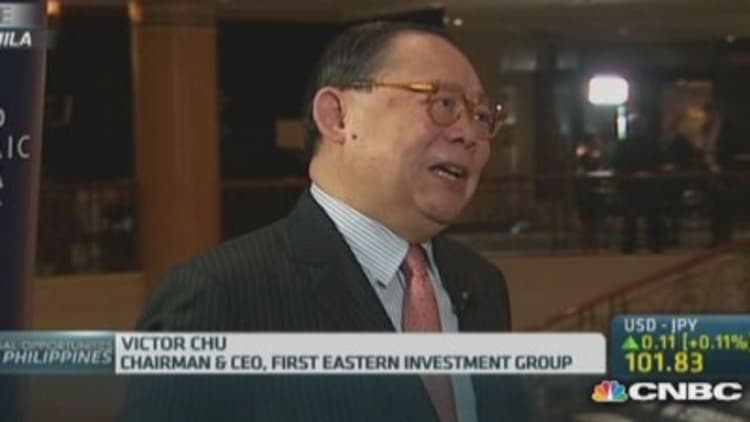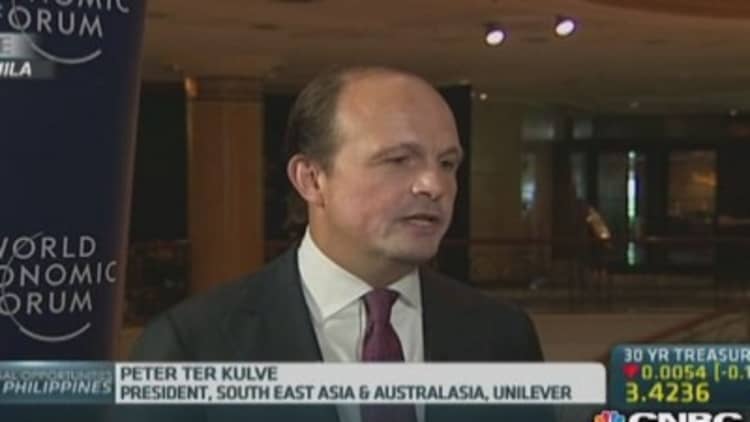
Thailand's military coup may have shaken confidence in the country's outlook, but businesses and investors are taking the loss of democracy in stride.
"Intellectually, we are disappointed," Victor Chu, chairman and CEO at First Eastern Investment, one of China's largest private equity and venture capital firms, told CNBC on the sidelines of the World Economic Forum in Manila.
"I've been talking a lot to my Thai friends here and they seem to be quite relaxed. Some of them even say this is probably the best solution in the circumstances," he said. "I don't sense fear. I think I sense relief."
Read More Why Thailand's latest coup is different this time
After more than six months of political protests and two days of martial law, Thailand's army chief General Prayuth Chan-ocha declared the military had seized power in a coup late Thursday. The country has faced 19 military coups, 12 successful, since it became a constitutional monarchy in 1932.
"As an investor, I'll probably begin to look at investing in Thailand, because stability may return and hopefully, this is a temporary situation to bring about the continuation of the democratic process in earnest in the long term," Chu said.
Among international companies with operations in Thailand, business appears to be normal.
"The business is continuing," Peter ter Kulve, Unilever's president for Southeast Asia and Australasia, told CNBC.
Even the military's imposition of a 10pm to 5am curfew hasn't affected operations at Unilever's 24-hour operations in the country as it is a "soft" curfew, with workers allowed to enter and leave the factory, he said.
"We don't expect the situation to deteriorate," he said, but even if it does, it's unlikely to affect Unilever's supply chain around the region. "Thailand is an outstanding manufacturing base, but the same products are also produced in other countries."
Read More Thai army takes power in coup after talks between rivals fail
To be sure, there are still risks that problems may develop for manufacturers operating in the country.
"It's more of an issue of how it might impact business logistics, just-in-time manufacturing, if things escalate," Steve Vickers, CEO of Steve Vickers & Associates, a risk mitigation consultancy, told CNBC, adding he's also concerned about businesses which depend on the airports staying open. In 2008, anti-government "Yellow Shirt" protestors stormed Bangkok's international airport, shutting down most flights for around eight days.
"Hopefully, things aren't going to get worse on the ground, but we must predict a backlash. The (pro-government) Red Shirts won't sit still for this," Vickers said.
Read More Thailand's growth outlook goes under the knife
Even without an eruption of violence, businesses may start looking outside Southeast Asia's second-largest economy for opportunities.
"What remains to be seen is what opportunities are lost for Thailand," Kristie Kenney, the U.S. ambassador to Thailand, told CNBC. "New investors may select new Southeast Asian destinations. Southeast Asia is an attractive place for American businesses, but there are a lot of options."
Rather than a sharp selloff, investors in Thailand's financial markets appear to have taken to the sidelines. After opening down over 2 percent, the SET index is down around 1.5 percent midday and the baht has remained within an around 30 pip range against the dollar this week.
Read More Thailand's crisis: What you need to know

"Political concerns aside. It's a great economy, it's a great country, and there are great companies there," Bill Maldonado, chief investment officer for Asia Pacific at HSBC, said Thursday before the military's coup became official. "There are a lot of things people really like about Thailand and the economy and so there's a lot to play for there. That's why people are not walking away in droves."
But he noted HSBC isn't positioning significantly in Thailand, or on the outcome.
"We're not putting clients' money at risk on our analysis of what we think is an unanalyzable situation," Maldonado said. HSBC has a slightly short position on the baht.
Read More Is martial law the last straw for Thai investors?
Of course, part of the reason for the relatively muted stock market reaction is investors that likely to sell already have.
So far this year, foreign and domestic investors in Thailand mutual fund and exchange traded funds (ETFs) have pulled out around $1.28 billion, according to data from Jefferies. Foreign investors yanked $379 million in the May 15-21 period, the data show. In 2013, foreign investors pulled around 194 billion baht, or $6 billion, from Thai shares, reversing the inflows from the previous four years.
"I don't think it will get worse. The market has more or less digested it, so probably they're going to call a bottom," First Eastern Investment's Chu said.
—By CNBC.Com's Leslie Shaffer; Follow her on Twitter @LeslieShaffer1

